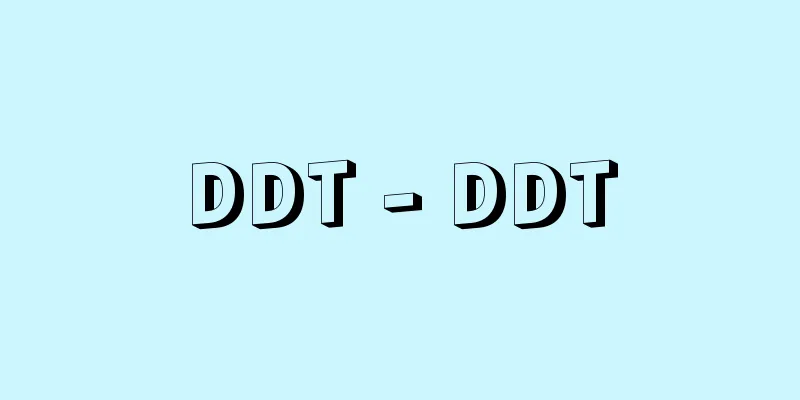DDT - DDT

|
Abbreviation for dichlorodiphenyltrichloroethane. The official chemical name is 2,2-bis (p-chlorophenyl)-1,1,1-trichloroethane. The USP name is chlorophenothane. It is a pioneer of organic synthetic insecticides, synthesized by Othmar Zeidler (1859-1911) in 1874, and its insecticidal properties were discovered by P. H. Muller of Switzerland in 1939. It was used for military purposes in Germany and the United States during World War II, and after the war it was widely used in various countries to control sanitary pests such as mosquitoes, flies, and lice, as well as agricultural pests. There are four isomers depending on the position of the chlorine bonded to benzene, but the most insecticidal are p and p ' (about 80% of the crude product), which are white needle-shaped crystals. It is synthesized by dehydration condensation of monochlorobenzene and chloral with sulfuric acid. It is insoluble in water. It is a stable compound that is difficult to decompose chemically or microbially. DDT is a neurotoxin that acts on nerve fibers, and is highly toxic to cold-blooded animals, but generally weak to warm-blooded animals such as mammals. It bioaccumulates through the food chain and ultimately accumulates in the fatty tissues of the human body, causing residual toxicity problems. In 1969 (Showa 44), Japan voluntarily stopped production of DDT, and in 1971 its use was banned. [Murata Michio] [References] |Source: Shogakukan Encyclopedia Nipponica About Encyclopedia Nipponica Information | Legend |
|
ジクロロジフェニルトリクロロエタンdichlorodiphenyltrichloroethaneの略称。正式化学名は2,2-bis (p-chlorophenyl)-1,1,1-trichloroethane。USP記載名はクロロフェノタン。有機合成殺虫剤の先駆をなすもので、1874年にツァイドラーOthmar Zeidler(1859―1911)により合成され、1939年にスイスのP・H・ミュラーによって殺虫力が発見された。第二次世界大戦中ドイツやアメリカで軍用に使用され、戦後は各国でカやハエやシラミなどの衛生害虫、あるいは農作物の害虫防除に広く用いられた。ベンゼンに結合するクロルの位置により4種の異性体があるが、殺虫力の強いのはp,p'(粗製品中約80%)で、白色針状結晶。モノクロルベンゼンとクロラールを硫酸で脱水縮合して合成する。水には溶けない。化学的に、また微生物的に分解しにくい安定な化合物である。DDTは神経繊維に作用する神経毒で、冷血動物に強い毒性を現し、哺乳(ほにゅう)類などの温血動物に対しては概して弱い。食物連鎖によって生物濃縮され、最終的に人体の脂肪組織に蓄積されるため残留毒性が問題となって、1969年(昭和44)より日本では自粛的に生産を中止し、1971年から使用が禁止となった。 [村田道雄] [参照項目] |出典 小学館 日本大百科全書(ニッポニカ)日本大百科全書(ニッポニカ)について 情報 | 凡例 |
<<: Titi monkey - titimonkey (English spelling)
Recommend
Hotokegaura
A rocky coastline stretching for about 3km betwee...
Arius maculatus
A marine fish of the order Siluriformes and family...
Kamata family
The Suto (Mori) clan (Sudouji) of the Northern Fuj...
Galleria Nazionale dell'Umbria (English) Galleria Nazionale dell'Umbria
…Next to it, in Piazza IV Novembre, there is a la...
Acer mono (English)
… [Ken Ogata]. . … *Some of the terminology that ...
Acute toxicity test
…The activity of the compounds picked up by this ...
Kamuihopunire - Kamuihopunire
…I means "that" (spiritual being) and &...
Austin, John
Born: March 3, 1790, Cretin Mill, Suffolk [Died] D...
Dazhai - Daisai
A production battalion belonging to the Dazhai Pe...
Seidokyo
A gorge located about 70 km south-southwest of Yin...
New Confucianism
...When historical and social developments threat...
Transhumance people - Ibokumin
…Of course, the distance traveled varies from reg...
African art - African art (English spelling)
Art of the African continent. Excludes Egyptian ar...
Henry II - Henry
King of France (reigned 1547-1559). Son of Francis...
crayon manner
...There was also a technique that combined the a...



![Odai [town] - Odai](/upload/images/67cb16002fbb5.webp)



![Niiza [city] - Niiza](/upload/images/67cc6af849d34.webp)

